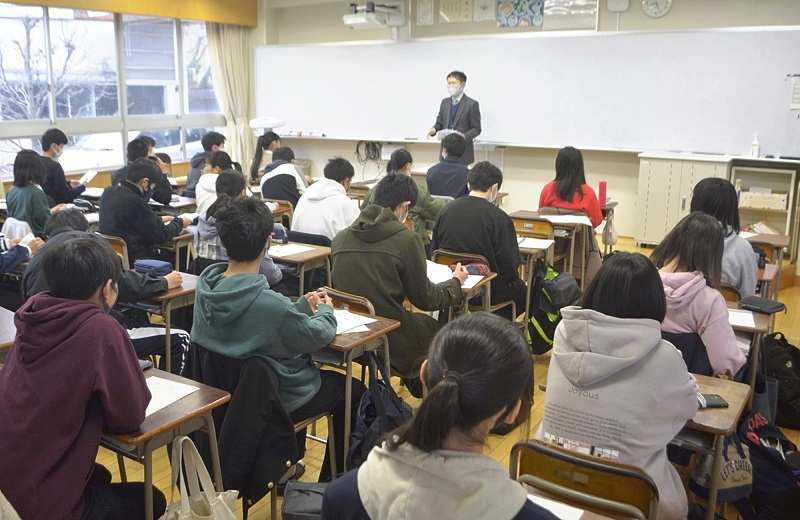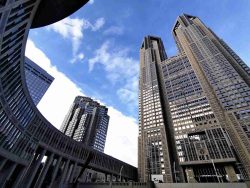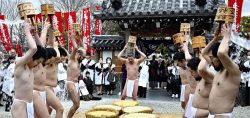
Many students take classes out of uniform in an experiment conducted at Gifu Kita High School in Gifu by letting students wear whatever they want to school on Feb. 26.
11:10 JST, March 27, 2021
OSAKA — The Osaka District Court handed down a ruling in February saying it was not illegal for a high school to regulate its students’ hair, in a damages suit brought by a 21-year-old former student who claimed that she had been forced to dye her brown hair black.
The case is drawing public attention to the proper form of school rules, prompting schools and local boards of education across the country to review these regulations.
Not illegal, but damages awarded
The Osaka District Court concluded “there is no illegality” either in the school rules or in the high school’s direction that banned students from dyeing their hair while in school. The court presented its view that the proper form of school rules “will differ, depending on such factors as the educational philosophy, policy and situation of each school,” and that “the rules cannot be said to be illegal as long as they are stipulated for a fair educational purpose and deemed reasonable in light of a socially accepted idea.”
Nevertheless, the court ordered the school to pay ¥330,000 to the woman in damages, saying the school’s handling of the matter was problematic because the woman became unable to attend school after she was instructed to dye her hair.
The lawyer for the plaintiff called the ruling “effectively a defeat,” and the woman has appealed the decision to the Osaka High Court.
But after the case was filed back in 2017, the Osaka Prefectural Board of Education instructed Osaka prefectural-run high schools to review their rules.
Of the 135 full-time high schools, 53 have either altered their ban on brown hair into a ban on the dyeing or bleaching of one’s hair, in consideration of students whose natural hair color is brown, or removed such anachronistic rules as forbidding students to come to school in geta Japanese wooden sandals.
“Schools have to maintain the flexibility to be able to improve school rules so they’re appropriate for bringing up children,” said an official at the Osaka Prefectural Board of Education.
Specifying the color of underwear
The Education, Culture, Sports, Science and Technology Ministry calls for school rules to be re-examined in accordance with changing times in its student guidance outline presented in 2010.
In surveys conducted by civil organizations and others in the wake of the lawsuit, unreasonable and improper school rules such as specifying the color of students’ underwear came to light, forcing local boards of education to take steps.
The Nagasaki Prefectural Board of Education surveyed 237 public-run junior high and high schools within the prefecture from last December, inquiring whether they specified the color of students’ underwear as white.
It found that 137 schools, or nearly 60% of the total, required underwear to be white through school rules and other measures.
Saying such rules are out of date, the prefectural board called on schools and municipal boards of education to reexamine such stipulations.
Specifying white underwear for students is said to have been adopted to maintain strict discipline at schools around the 1980s, when schools were in turmoil amid deterioration in students’ morals, such as violence and bullying.
“Those rules might have been necessary back then, but they’re no longer needed now. Schools must think about the meaning of each of their rules,” said an official in charge at the prefectural board of education.
Students taking part
Some schools have had students take part in discussions concerning school rules, enabling students to think and learn more proactively.
Gifu Kita Senior High School, conducted an experiment at the suggestion of its student council, letting students wear anything they wanted to school from Feb. 15 through Feb. 26. It was aimed at having students think about the school uniforms — the school had dictated in detail how they were to be worn — including the idea of allowing students to wear anything they want.
Based on opinions of the students and their guardians, the school will discuss whether the rules should be changed.
Student council member Honoka Yasuda, 17, said, “We want to compile students’ ideas and present our ideas for improvements to make our school life more comfortable.”
Principal Ken Suzuki said: “Being aware of the issues involved, and thinking and acting on their own will help students develop their independence.”
At Yasuda Girls’ Junior & Senior High School, a private school in Hiroshima, a volunteer group of about 20 students conducted a schoolwide questionnaire on rules that the students want to see changed. After having students discuss the matter, the group presented the results to the administration and ultimately got three things changed. This included having a previous ban on bringing smartphones to school changed, to allow students to bring them with certain conditions.
Kaoru Yasuda, an assistant to the school principal said, “Through a series of discussions, the students have become able to think and express their opinions more logically.”
Top Articles in Society
-

Producer Behind Pop Group XG Arrested for Cocaine Possession
-

Man Infected with Measles Reportedly Dined at Restaurant in Tokyo Station
-

Woman with Measles Visited Hospital in Tokyo Multiple Times Before Being Diagnosed with Disease
-

Bus Carrying 40 Passengers Catches Fire on Chuo Expressway; All Evacuate Safely
-

Tokyo Skytree’s Elevator Stops, Trapping 20 People; All Rescued (Update 1)
JN ACCESS RANKING
-

Producer Behind Pop Group XG Arrested for Cocaine Possession
-

Japan PM Takaichi’s Cabinet Resigns en Masse
-

Man Infected with Measles Reportedly Dined at Restaurant in Tokyo Station
-

Israeli Ambassador to Japan Speaks about Japan’s Role in the Reconstruction of Gaza
-

Videos Plagiarized, Reposted with False Subtitles Claiming ‘Ryukyu Belongs to China’; Anti-China False Information Also Posted in Japan
























